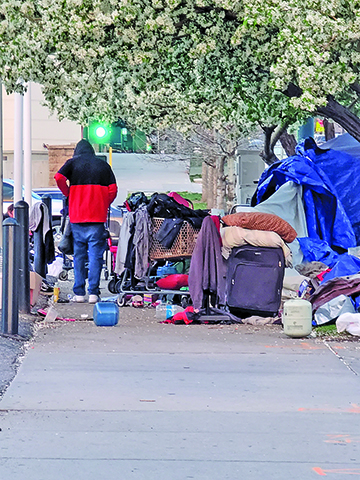
by Regan Bervar | Mar 18, 2022 | Main Articles
“Well, if there ain’t gonna be any rules, let’s get the fight started.”
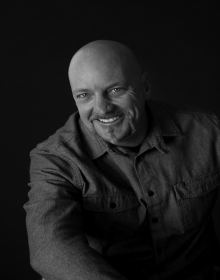 by Luke Schmaltz
by Luke Schmaltz
Terry Hildebrandt, PhD, is at war. The Denver district where he lives — the Golden Triangle — is anything but a gilded community of urban bliss. On any given day, he encounters the detritus of illegal campers which can include feces, trash, burned up tents, used needles, and more. At all hours of the day and night, Hildebrandt contends with fighting between encampment tenants, incessant screaming, blocked sidewalks, theft of businesses and residences, sexual abuse, and physical altercations which threaten his safety, that of his neighbors, and just about anyone else who enters the area.
Two Steps Back
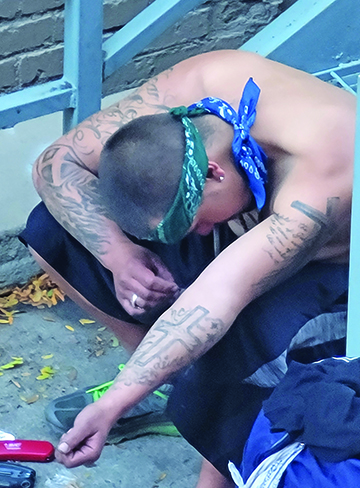
The alley behind Hildebrandt’s office has been dubbed “Heroin Alley.”
The latest installment of feckless legislation poised to exacerbate spiraling crime was signed into law by Governor Jared Polis in early July 2021, and enacted on March 1, 2022. For Terry Hildebrandt, the most concerning features of Senate Bill 271, the Misdemeanor Reform Bill, “is that the law now allows certain felons to possess guns, making it harder for police to remove guns off the streets, due to a change to Colorado Revised Statutes Section 346: 18-12-108 regarding possession of weapons by previous offenders,” he explains.
“Previously, all convicted felons were prohibited to buy or possess firearms. Now, many felons will be allowed to possess firearms, unless they were convicted of Victims’ Rights Act offenses, such as murder, child abuse, and sex assault. For example, this means all previous offenders convicted of felonies that were related to drugs, burglary, arson, and many other reasons will now be allowed to possess guns. Both 18th Judicial District Attorney John Kellner and Denver Police Chief Paul Pazen have publicly expressed serious concerns about SB21-271 and the likely impact it will have on crime rates in Colorado due to more felons being allowed to possess guns.”
The New Skid Row
Meanwhile, Hildebrandt is fighting for the sanctity of the downtown Denver community at large and for the dignity of those who choose to call the Golden Triangle home. Defelonization of the possession of illegal drugs and use of illicit substances, along with the neutralized authority of a Denver Police Department, has turned his district into an urban hellhole. “During the summer of 2021,” he begins, “I had to call 911 to report a man passed out in the alley right by 10th Ave, laying in the way of traffic on the hot concrete. The man could have been run over by a car since that is a busy alley. The Fire Department arrived quickly to check on him. It was around 95 [degrees] that day, so heat stroke was a real possibility,” he says.
Hildebrandt continues, “In 2021, we had a lot of heroin and meth open use in the alley right outside my home and business, which I renamed to Heroin Alley. I have dozens of photos of addicts with heroin needles in their arms and toes and smoking meth and fentanyl. We regularly found used needles all over in the Golden Triangle neighborhood. I was calling 911 up to five times a day to report open drug use and other health crises in my neighborhood. In 2021, I joined forces with a nonpartisan, diverse group of like-minded people, to cofound the nonprofit, Citizens for a Safe and Clean Denver,” he explains.
Complicated Circumstances
Hildebrandt is quick to point out he is not simply condemning the dangerous conditions in his community. He is instead, pointing to contributing factors, such as how many of his property-owning peers choose to simply look the other way rather than insist upon the city doing better. The current policy is for authorities to offer treatment services and shelter to the unhoused living in tents (which is almost universally declined) rather than insist on it — especially for people suffering from addiction and/or severe mental illness. “I see no excuse left to ever tolerate allowing anyone to rot on the street in an illegal tent to overdose and freeze to death,” he says. “How is there any dignity for the unsheltered in allowing dangerous, illegal enc

The Golden Triangle district in downtown Denver is dangerous to all residents, housed and unhoused.
ampments to remain?”
“The sad part is that Denver can find shelter for everyone on the street,” Hildebrandt says. “Skye Stuart (Legislative Director & Sr. Advisor for Policy & Legislation, Mayor’s Office) at Public Hearing: CB 21-0592, said, ‘I do want to be clear that we do have hundreds of beds available every night. If every person off the street wanted to come in, would we need to do some things — like open some rec centers — absolutely, but we do have some flexibility in our system that will accommodate for that.’”
Passing The Buck
Meanwhile, people who are arrested for offenses such as drug dealing, burglary, trespassing, automobile theft, sexual assault, harassment, and other crimes are being inexplicably released by the courts on PR (personal recognizance) bonds in a matter of just a few hours after being detained. Hildebrandt has voiced his concerns to top officials, stating, “We met with District Attorney Beth McCann, and she blamed the judges for releasing accused criminals on PR bonds. McCann took no responsibility for the dramatic increase in accused dangerous criminals being released on PR bonds while awaiting trial, saying that the judges set bail — not the DA,” he says.
Hildebrandt continues, “McCann also told us that she has no data readily available to us to understand which judges are to blame for this mess. I am deeply frustrated and disappointed in the lack of accountability in the judiciary. The public has no easy way to hold judges accountable for releasing dangerous, violent criminals, and drug dealers to re-offend. Tony Kovaleski at Denver7 reported that data from open records laws from the courts show 1,298 arrests for felony drug offenses. The data also show that 69% of all accused individuals arrested for those drug offenses were granted PR bonds and show that 45% of individuals arrested for felony drug offenses and granted a PR bond failed to appear for at least one court hearing,” he explains.
To say these circumstances are discouraging to law enforcement officials with “boots on the ground” would be an understatement. “I have personally witnessed the negative impact on the
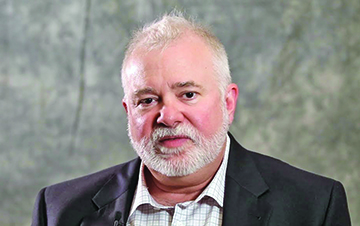
Dr. Terry Hildebrandt, PhD. lives and works in the Golden Triangle district which has become an urban hellhole.
morale of our police force when accused, violent criminals and drug dealers are released after the police risked their lives to arrest dangerous criminals,” Hildebrandt says. “I have also seen the frustration and fear of victims, who are subject to the same perpetrators over and over when these criminals are back in the community where they can re-offend.”
A Glimmer Of Hope
Despite the host of setbacks in his front yard, Terry Hildebrandt is focused on solutions. He is quick to point out that legislation which is counteractive to SB 21-271 has been introduced. “HB 22-1257 just passed the house,” he says. “It will help fix some of the issues if it passes in the Senate. [It] would add certain felony offenses, such as criminal extortion, enticement of a child, unlawful termination of pregnancy, and arson, back onto the ‘possession of a weapon by a previous offender’ (POWPO) list. However, it does not fix the issue of felons with drug convictions being allowed to possess guns,” he explains.
Extreme Measures
Some citizens are fed up, mistrustful of the legal system, and doubtful that law enforcement will come to their aid should they be accosted, assaulted, attacked, robbed, or worse. What then, you might ask, can you do to bolster your personal safety?
There are numerous Denver enterprises in the business of teaching people to protect themselves from violent criminals. This is not a new idea, rather, it has been a celebrated aspect of daily life in the Mountain West region since before the Mile High City was founded back in 1876. For a fair price, any able-bodied adult or minor with parental consent can learn to safely and proficiently operate, carry (18+ only), and maintain a firearm intended for self-protection. Places such as Lipstick Tactical (emphasizing women’s safety), BluCore Shooting Center, and Final Protective Line Academy are centers of education, awareness, and training for law-abiding citizens concerned with their personal safety. These and other similar enterprises are ideal places for garnering the proper training, knowledge, and testing required for obtaining a conceal and carry license.
If firearms are not your cup of tea but personal safety is, Denver offers a wealth of destinations for self-defense training in hand-to-hand combat styles such as Krav Maga, Jiu-Jitsu, Kung Fu, and many, many more. Folks too busy to take on a new discipline are wise, at the very least, to invest in practical means of deterring assailants such as pepper spray, bear spray, mace, or some similar, user-friendly device. If the government will not exact punishment against those who aim to harm law-abiding citizens — then the populace at large must assume sole responsibility for their own wellbeing. As for those who choose to harm themselves on the taxpayers’ dime — that mess, for now, is still your problem.

by Regan Bervar | Mar 18, 2022 | Feature Story Bottom Left
Is Important In An Increasingly Critical Society
“Believe you can and you’re halfway there.”
 by Luke Schmaltz
by Luke Schmaltz
The way you carry yourself as you go about your daily business has a lot to do with how people react to your presence.
Your physical posture, the way you walk, the expression on your face, and other nuances of body language send out a message. In the instance of a confident person, you exude strength and internally fortified will. To the contrary, if you entertain unhealthy amounts of self-doubt — it will show in your demeanor — and therein lies the problem.
Self-confidence and lack thereof is the result of internal transactions. Confidence is informed by “what you say when you talk to yourself” — a reference to the wildly successful work of author Shad Helmstetter. The notions of high and low self-esteem are reinforced by how you react to everyday events — whether you are a participant or a spectator. Rarely do people remain stagnant in the face of the constant comparisons, deprecations, and self-criticisms that are all the rage today — especially among young folks. You either buckle under social pressure and give in to low self-esteem or you make a conscious decision to fight it.
An Internal Struggle

Positive or negative self-image can be determined by what you say when you talk to yourself.
In today’s viscously hypercritical society, many people are subjugated by the strictures of an unachievable ideal. Yet others, far fewer in number, learn to steel themselves against the judgements of the status quo. The former is the path of a person who is constantly afflicted by feelings of inadequacy. The latter is a way to create a unique identity by pursuing a set of personal aspirations rather than measuring yourself by the yardstick of others.
The question, then, is how to avoid one while embracing the other. Thankfully, there are several ways to gradually build and maintain confidence and self-esteem without becoming an insufferable, overblown egomaniac. Meanwhile, this pursuit can help you insulate yourself against the quagmire of cultivating a lousy self-image.
Exercise Often

Self-esteem can be bolstered by positive daily habits including rigorous exercise, healthy diet, and sufficient sleep.
While doing a few pushups here and some jumping jacks there is a good start, maximizing this step requires a more comprehensive approach. By engaging in some form of physical exertion at least three times a week for 20 or 30 minutes, you are training your body to release endorphins which induce positive feeling while reducing your brain’s perception of pain. The best way to start is to pick a type of exercise you genuinely enjoy, and which suits your abilities, such as walking, running, swimming, or yoga. If you are new to the world of working out and you decide to become a bodybuilder overnight, you will wind up mired in unrealistic expectations, disappointment, and potentially plummeting self-esteem.
Eat Real Food
Refined carbohydrates such as processed flour and rice, sugar-sweetened juices and sodas, and processed snacks such as corn chips, cookies, and pastries can cause inflammation and hormonal imbalances due to high levels of sugar and indigestible compounds disguised as food. Conversely, raw fruits and vegetables, sprouts, leafy greens, lean meats such as chicken and fish, as well as water from a spring or a reverse osmosis filter are all easily absorbed by the body. A diet of these foods will help you to feel better after eating and more inclined to exercise whereas a diet of junk which your body cannot process will leave you feeling tired and unmotivated which can, in turn, lead to negative internal dialogue.
Get Plenty Of Sleep
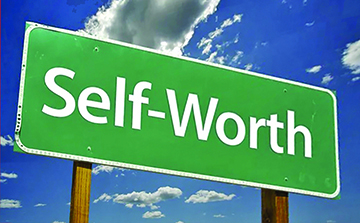
Self-worth can be successfully maintained by evaluating oneself from within rather than comparing oneself to others.
Optimism and self-esteem begin with a good night’s sleep. A recent report by Harvard University’s Dr. Lawrence J. Epstein states that, “Sleep and mood are closely connected; poor or inadequate sleep can cause irritability and stress, while healthy sleep can enhance well-being.” Epstein goes on to explain, “It’s possible to eliminate many minor sleep problems by creating a comfortable sleep environment, maintaining a healthful balance of nutrition and exercise, and engaging in relaxing activities near bedtime.”
Go Easy On Yourself
When you make a mistake, and everyone does, resist the urge to punish yourself with a bunch of negative internal scolding. Whatever setback you may have encountered is enough of a reminder without willingly inflicting further damage to your self-confidence. That is not to say that denying anything went wrong is a smart course of action but having a bit of compassion for your own grazed ego can help you get back to work and put things you can’t change behind you.
Face Them Down
Stepping outside of your comfort zone is a terrific way to build self-esteem and confidence. The simple act of facing your fears, whether you succeed or not, is an effective way of building yourself up internally based on your own perceived limitations. Granted, jumping out of a helicopter without a parachute is a legitimate fear and is a practice best left to movie stuntmen. Yet, exposing yourself to non-lethal fears such as public speaking, swimming in a shallow, supervised pool, or petting a trained, tame dog can do wonders for your anxiety levels. Small victories over irrational fears can build up your self-confidence and eventually lead you to experience huge breakthroughs.

by Regan Bervar | Mar 4, 2022 | Feature Story Bottom Left
“So, bye-bye, Miss American Pie / Drove my Chevy to the levee,but the levee was dry / And them good ol’ boys were drinkin’ whiskey and rye / Singin’, This’ll be the day that I die”— Don McLean
 by Luke Schmaltz
by Luke Schmaltz
March 25, 2020, was the day the music died in Denver, Colorado. Governor Jared Polis ordered the closure of all nonessential businesses — which included music venues of all shapes and sizes, from the tiny Tooey’s, off Colfax, to Red Rocks Amphitheater.
The circumstances were devastating, not only for venues but for musicians as well — as the vast majority make their living on live performances and on-site merchandise sales.
As the long-term implications of lockdown life settled in, some Denver musicians vowed to forge forth with online performances while others relinquished themselves to spend the downtime writing new material. A slew of lifelong musicians found a way to persevere, and now that the music scene is back in full swing, they are seeing their circumstances with newfound determination.
Meanwhile, the city itself has lost a number of beloved venues. Those that found a way to hang on during the pandemic are back to hosting shows as Denver is quickly reclaiming its reputation as a thriving hub for live music.
The Legend

Erica Brown has been dubbed, “Denver’s Queen of the Blues” and deserves the title, hands down (or up). Image: Marilyn Stringer
Erica Brown is Denver Blues royalty and an internationally acclaimed singer, songwriter, and recording artist. Every local publication that covers music has praised her award-winning work and she has been featured internationally in Smithsonian Magazine, Blues Matters (UK), and Rootstime (Belgium). “When the pandemic hit,” she begins, “I was putting together a dream project of mine, called the Cast Iron Queens. We had just played our first sold-out show in December at Dazzle, then in January, I had gone to Memphis and emceed the National Women in Blues Event. We were the entertainment for the Womxn’s March, we did a live in-studio for KGNU Radio in early March, then everything went ‘poof!’”
Brown is thankful that she was able to work through the pandemic, explaining, “Nearly every musician has either a regular day job or a couple side hustles (smile) and since [my job] was in a sector deemed ‘essential’ I never quit going to work.”
Brown reflects on the unfortunate Covid-related loss of Denver music institution El Chapultepec along with resident musical legend Freddy Rodriguez Sr. — a dear friend. Yet, she is thankful that longtime venues such as the Rusty Bucket, Mercury Cafe, and Lincoln’s Roadhouse are still alive and kicking.
Moving forward, Brown’s future is looking bright, “In November 2021, I’m was thrilled to be singing America the Beautiful at Boettcher Concert Hall on Veterans Day. It was the World Premiere of a documentary by professional skier and filmmaker Chris Anthony, called “Mission Mt. Mangart” which tells the story of the 10th Mountain Division’s great ski race in 1945,” she explains. In 2022, Brown will be immersed in theater productions, tribute projects, and much more — stay tuned at erica brownentertainment.com.
The Hardworking Bard
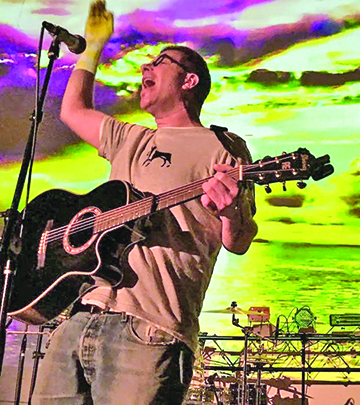
Sputnik Slovenia didn’t miss a beat when the pandemic hit, and continues on Facebook Live every Friday. Image: Sputnik Slovenia
Sputnik Slovenia has been a fixture of the Denver music scene for well over 20 years. He currently sings in a Clash cover band called The Nuns of Brixton, fronts an original, punk rock band called The Pitch Invasion, and plays regularly as a solo acoustic act. The latter served as his sole outlet during the first several waves of the pandemic. “I started streaming live shows basically the week the pandemic started,” he begins. “I had been doing a Friday happy hour at the Larimer Lounge for the past few years, so I jumped online the very first week and continued with my happy hour via Facebook Live. The response has been great. I post the shows and they get hits all during the week. I can interact with my friends from across the country and across the world every Friday, and it lets other people connect via the web as well, so check in on Facebook live on Fridays at 6 p.m. Mountain standard time.”
Slovenia contends that among the best live venues in town is the fairly new EastFax Tap and the legendary Lions Lair — which he hails as “One of the best dive bars in the country.” While he laments the loss of staple venues such as Tooey’s and 3 Kings Tavern due to the pandemic, he credits the down time for kicking him into high gear to work on his record label, Rum Dummy Records, whose Bandcamp page offers recordings from most of Slovenia’s projects. “The pandemic really was one of my most prolific times,” he explains. “I even wrote a rap song called Covid was my chrysalis.”
The Virtuoso

Juaquina “Roqui” Lluma teaches music, hosts a radio show, and awaits her next post-pandemic, high-profile bass playing gig. Image: R2Shotz
Juaquina “Roqui” Lluma is a recently naturalized U.S. citizen — originally from Argentina — who came to Denver by way of Los Angeles. She is a lifelong, classically trained musician who, for years, ground it out in the City of Angels playing in club-circuit level bands. Yet, the “L.A. Bullshit Attitude” — as she and many other musicians refer to it — drove her to seek the more genuine climes of the Denver music scene back in the mid-2000s.
Just before the pandemic hit, Lluma was seemingly headed for the big time — juggling bass duties between blues rock powerhouse Hot Apostles and the country rock outfit Tracksuit Wedding. By late March of 2020, both acts were immobilized and a year later when things began to finally loosen up — both projects were no more.
Regardless, Lluma forges onward with music, currently teaching online lessons and co-hosting an Internet radio show dubbed El Crawlspace hosted by nucleorock.com. “I am doing this with a friend from Puerto Rico,” she begins, “The idea is to be a link between all the underground scenes. We focus on rock and underground music — anything that all the other Latin radio stations aren’t already doing. Our listeners are from all over the world: Europe, Mexico, Colombia, and more.” Lluma aspires to make this enterprise an international link between the underground scenes. “The show could be a contact point between bands overseas and bands over here,” she says.
Moving forward, Lluma keeps a keen ear to the grapevine in anticipation for the next high profile bass playing gig. She also pays particular respects to the folks at the Oriental Theater for “keeping shit real” by putting on their “Safe and Sound” music series during the waning months of the pandemic.
The Career Man
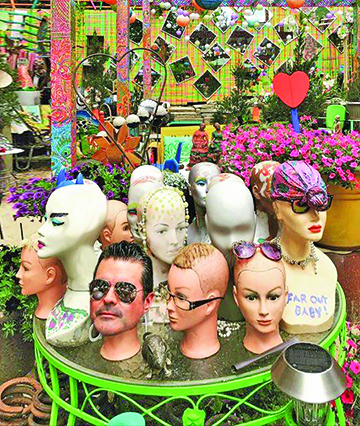
Jim Dalton (bottom left) plays solo, with The Railbenders and with Roger Clyne and the Peacemakers. Image: Jim Dalton
As the front man, guitarist, songwriter, and founding member of The Railbenders, Jim Dalton has done more than his share to bolster the Denver music scene by building a fiercely loyal following and inspiring hordes of other musicians. Dalton also holds down lead guitar duties for Arizona-based national touring sensation Roger Clyne and the Peacemakers. His position in the latter act took up the majority of his time until all tours were canceled in early spring of 2020.
Dalton decided to use his pandemic down time to flesh out and record a solo album titled “In My Head.” The 11-song opus includes an eclectic array of original tunes he’d been working on over the last couple of years. “The song, ‘In My Head,’ was the first tune I wrote after my father passed away from cancer in 2015,” he explains, “It has been around quite a while and I have always included it in my live solo shows. Same with the other songs on the record,” he continues, “the pandemic gave me the time to finish recording since all of our tours were canceled for over a year.” Of all the venues the pandemic claimed, Dalton laments the loss of 3 Kings Tavern. “Lotta good memories and emotional ones,” he says. “We held an Irish-style wake there for both my Uncle Terry and my father.
Moving onward, Dalton is set to soon get back out on the road with Roger Clyne. He is also looking forward to an upcoming two-night Railbenders run at Denver’s Globe Hall. He also cherishes the fact that some of his favorite long-standing Mile High venues are still in business. “Some of my favorites are Lincoln’s Roadhouse, Soiled Dove, Bluebird Theatre, and Herman’s Hideaway. But if I had to choose one,” he explains, “I’d say everyone needs to see a show at Red Rocks once in their life.”
The Wunderkind

Red Stinger are prolific in the creativity department, having released five studio albums in their 10-year tenure before the pandemic. Yet, 2020 shifted their productivity into overdrive. During the second, third and fourth quarters of 2020, the band’s singer, guitarist, and principal songwriter — Tim Merz aka Timmy Flips — conceived of a nine-part series of content releases and proceeded to embark on the most creative period of his life.
Merz, a ballroom dance instructor by day, explains, “During covid I wrote a full-length album titled Punk Rock Ballroom — a hip hop rock album available on Bandcamp. Then, I wrote The Stinger Scriptures — a nine-part rock album rewrite of the Bible. After that,” he continues, “I wrote Crooked Town — a ballroom ballet dance interpretation of the Battle of Armageddon.”
Merz’s Covid accomplishments also include a ballroom dance love story, a stage play about intergalactic alien enslavement, and much more. The singer cites his personal philosophy as the driving force behind his creative arc. “The current state of the world and the direction humanity has chosen is broken,” he says. “Humanity is constrained by our enslavement by money, religion, and weapons. Our political system has failed us, our religious leaders have failed us, our financial institutions have failed us. The only hope is a return to what is our truth and that requires a serious reshaping of what it means to exist — which is the true punk rock mentality. Punk is the refusal to accept that anyone has power over anyone else. A return to the physical human body and the realization that we are all the same and all equal in the eyes of death.”
Moving forward, Merz and his Red Stinger bandmates look forward to more recording work including a greatest hits album and a live album while keeping alive the hopes that, “Denver doesn’t become completely overrun by corporate music joints who only book bands with the appropriate amount of Facebook Likes.”

by Regan Bervar | Mar 4, 2022 | Main Articles
“The road to hell is paved with good intentions.” English proverb
 by Luke Schmaltz
by Luke Schmaltz
On a typical day, Dwayne Peterson awakens at 4 a.m. to go to the gym. Until recently, he would begin his day at the Colorado Village Collective (CVC)-run housing facility known as Beloved Community Village (BVC) in Denver’s Globeville neighborhood. On his way out of the gated “tiny home” enclosure, he would regularly witness other residents getting high on illicit substances, engaging in the trade of illegal drugs, and selling packages of dope through the chain-link fence. “I chose to get up early and leave the premises for the day to minimize the amount of interaction I would have with other residents,” he explains.
Peterson is a longtime Colorado resident who attended CU Boulder for undergraduate and postgraduate studies. He is a professional ballet dance instructor, teaching students of all ages and ability levels through his company, This is Dance, LLC. Four years ago, his landlord of 17 years sold the house where he was renting an apartment. The property was quickly slated to be demolished — leaving Peterson and four other residents suddenly unhoused.
An Unwelcome Guest
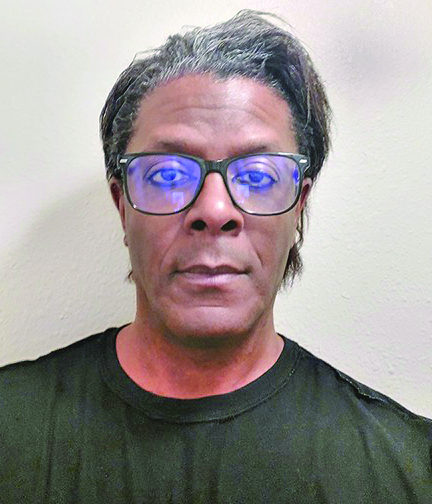
Dwayne Peterson encountered racism, violence, a death threat, and other adverse conditions at the CVC’s Beloved Community Village. Image courtesy of Dwayne Peterson
Peterson is sober with no criminal record and has never been a drug user — nor has he ever been diagnosed for mental health conditions. These factors not only made him an outcast among the BVC residents, but also made him the target of stalking, death threats, and racial attacks — which ultimately forced him to move out for the sake of self-preservation. “I was in an altercation the first day I moved in,” he begins. “There are constant disputes among residents because of the drug economy and the problems which inevitably arise” he explains.
At weekly BVC resident meetings, “there were heated disputes and physical altercations,” Peterson says. While he was quick to voice his concerns about the nonstop illegal activity, the resident-on-resident fighting, the all-night noise, and the open use of drugs — his protests fell on deaf ears as he was ignored by administrators and harassed by fellow residents. He could not shake the feeling of being constantly scrutinized by his neighbors as a non-drug user. Essentially, he was seen and treated as a rat.
Looks Great On Paper
CVC is headed by Cole Chandler, an ordained minister with a Master of Divinity (M.Div.) degree from Baylor University. He runs a non-governmental organization on a mission to “bridge the gap between the streets and stable housing by creating and operating transformational housing communities in partnership with people experiencing homelessness.” The CVC website further states, “We embody radical solutions to homelessness: housing that centers human dignity, empowerment of marginalized voices, and design solutions that are affordable, sustainable, and community oriented.” While the part about “radical solutions to homelessness” is definitely true, the rest — according to Dwayne Peterson’s eyewitness accounts — is window dressing at best.
Not What It Seems
Peterson firmly states, “Cole Chandler is lying to you. Plain and simple. The BVC is just a haven for criminal activity — a sanctuary for people to openly engage in crime — a contamination of resources and the community as a whole.” Peterson repeatedly went through the established CVC protocol for filing complaints about other residents who were making meth on site, preparing other drugs such as cocaine and heroin for distribution, and selling them directly from the property. “There was trafficking between residents and outsiders,” he says. “Exchanges were taking place right through the fence. People would drive up, make the trade and the customer would either drive off or just sit there and get high in their car before leaving.”
Blatant Disregard
When Peterson would file a complaint through the on-site “complaint portal” he would then receive notice that the situation was being investigated. “What would happen,” he states, “is that an administrator would knock on the resident’s door and casually tell them there was a complaint against them without having a discussion or conducting an investigation of the premises in question.” Essentially, the offending party was given ample time to cover their tracks, remove evidence, and come up with an excuse as to why they were being accused of drug trafficking, assault, etc. Peterson maintains, “These were haphazard investigations with unsubstantiated conclusions.”
Another instance of negligence on the part of CVC/ BVC staff occurred late one night when an outsider climbed over the fence and jumped into the enclosure to pursue a resident. An altercation ensued followed by a fight and the intruder stabbed the resident. “There was blood all over one of the decks,” Peterson explains. “Then, staffers started cleaning up the crime scene without even calling the police. The Tiny Home Village Director, Dorothy Leyba, was on site and said to a protesting Peterson, ‘We will handle this internally.’”
Rampant Racism
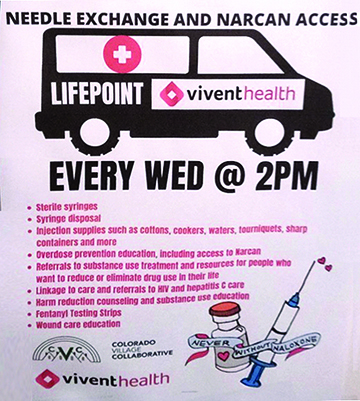
The CVC hosts Lifepoint Needle Exchange so their SOS residents can have plenty of fresh supplies for shooting up illicit, highly addictive drugs. Image courtesy of: Dawn McNulty
In an open letter to law enforcement and all others who should be concerned with his plight, Peterson describes a racially hostile environment where Caucasian residents repeatedly harass, threaten, and use racial slurs against African-American residents like himself. “I know of two previous individuals of color who resided at Beloved “Community” Village [who] left not because they located housing but attributed their weariness to being violated by Caucasian individuals residing at this emergency homeless shelter,” he writes. In the same letter, he elaborates further, “A current individual of color residing at this emergency homeless shelter, who continues to be violated by Caucasian individuals residing at Beloved “Community” Village and their guests, is reticent to communicate their being harassed. This individual believes [that by] reporting their being violated that they will be evicted.”
During the two years he lived at BVC, Peterson’s vigilance placed him in the crosshairs of one particularly aggressive Caucasian resident. “This person called me ‘a f***ing n***er’ and threatened to kill me by shooting me with a gun,” he explains. In the aforementioned letter, Peterson states, “I report these crimes to the city of Denver, law enforcement, and Denver City Council. Beloved “Community” Village staff, Cole Chandler, and Colorado Village Collaborative, et al have not performed their due diligence investigating these crimes. In ignoring the individuals committing these crimes, Colorado Village Collaborative, et al has only emboldened these individuals to continue their nefarious and insidious activities and lifestyles. Cole Chandler, regardless of the funding Colorado Village Collaborative, et al is receiving, is lying to the public and those he engages for funding.”
At The Crossroads
Peterson estimates that during the time he resided at BVC, he made at least 50 complaints with the Denver Police Department. “Nothing was ever done,” he explains. “That’s why I started blanketing Denver with what’s going on in BVC.” Drawing on his postgraduate-level college education, the well-spoken Peterson has drafted and sent articulate letters explaining the conditions, the lawlessness, and his specific circumstances to news outlets, lawmakers, government officials, law enforcement, and more. Peterson has recently been featured in articles by The Denver Post, Westword, and other publications. “Before I left,” he says, “They [CVC staff] became more aggressive towards me. They don’t want me talking to the Denver City Council or the press.”
At the time of this interview, 02/04/2022, Dwayne Peterson had been out of the BVC/CVC system for just two days — speaking from the parking lot of a Denver motel. His frustration is palpable, as he weighs his options for the foreseeable future. The irony of his situation is truly baffling, as a plethora of local agencies such as Colorado Coalition for the Homeless, St. Francis Center, and many others have refused to give him assistance because he is “high functioning” and “low risk.” “I was told by Colorado Coalition for the Homeless that I can’t be helped because I don’t have any problems,” he says.
To compound matters, Peterson has been diagnosed with cancer and is wary of overnight shelters. “They are unsanitary and unhygienic (think Hepatitis A, B, and C). Homeless shelters, in general, invite disease and violence,” he states. Additionally, and it should go without saying — the Covid-19 pandemic has made it difficult, and at times impossible, for Peterson to run his business which is built on in-person learning.
Reach Out
In yet another effort to remedy his situation, Peterson has started a GoFundMe campaign to raise funds so that he can secure long-term housing without having to endure the deplorable conditions in places like CVC’s properties and overnight shelters. Concerned readers who are interested in helping Mr. Peterson can donate here: https://www.gofundme.com/f/seeking-to-secure-housing.
Proliferation Of Dysfunction
Across town, the battle for the sanctity of the Lincoln/La Alma neighborhood continues, as Dawn McNulty — a resident of the adjacent Baker neighborhood — continues to fight the CVC’s recent installment of a Safe Outdoor Space (SOS) at 780 Elati St., on the outskirts of the Denver Health and Medical Center campus. Among her many concerns is the glaring reality that this property is governed by the same policies as the CVC’s other villages — including the BVC — former home of Dwayne Peterson. The fact that the Lincoln/La Alma SOS is within 1000 feet of three Denver Public School properties is in itself cause for alarm. “This is a bipartisan issue with well-intentioned, compassionate people working on both sides,” McNulty explains. “We must demand more of our city’s officials to ensure public health and safety. SOS sites are an incubator for crime and disease.”

Citizens for a Safe and Clean Denver do not want addicts and people with mental illness living next to schools and families with children. Image courtesy of Terry Hildebrandt, PhD
McNulty and fellow citizens of a group known as Citizens for a Safe and Clean Denver are staunchly against Safe Outdoor Spaces. They intend to address and remove the glaring oversights and extreme safety hazards to neighborhoods populated by families with children. As it turns out, their fight just got a whole lot tougher, as Denver City Council recently voted to allot $3.9 million of Denver taxpayer money to Cole Chandler and CVC so that they can install more city-sanction drug camps. If you think this issue doesn’t affect you, think again. An encampment of mentally ill, drug-addicted, illness enabled people could be coming to your zip code very soon. These folks do not stay in the camp all day, so they will most certainly be dropping by for a sprawl and an afternoon dope fix on your front lawn. Welcome to the new Dystopian Denver.
Adding insult to injury, the CVC enables the use and injection of illegal drugs by allowing Lifepoint/Vivent Health to distribute — for free — supplies such as syringes, needles, tourniquets, cotton swabs, cookers, and sharps containers to residents of Safe Outdoor Spaces. Also, should their assisted addiction service prove to be too effective, they supply Narcan for overdosing addicts and Fentanyl testing strips for suspicious-looking illegal narcotics that are well known among users to be deadly. Saintly enablement indeed.
Your Tax Dollars Not At Work
Meanwhile, Dwayne Peterson’s parting statements are stark, harrowing, and ring as true as the pavement under his feet. “Homelessness is being managed, not rectified. What astounds me is that no matter how much money is being thrown at it, it keeps getting worse.”

by Regan Bervar | Jan 21, 2022 | Editorials
“When we clutter our lives with imagined obligations, unnecessary activities, and distractions that only kill time, we dilute the power of our lives.” — Anne Katherine
 by Luke Schmaltz
by Luke Schmaltz
For the last 200,000 years, the human psyche has been overarchingly concerned with the physical world — aka the Outernet.
Even after the invention of the printing press in 1440, the focus of most humans was on food, water, shelter, weather, the changing seasons, the nighttime sky, flora, fauna, and other groups of nearby people.
The fascination with inward worlds, other than stories passed on through hieroglyphs and the oral tradition, most certainly began with the written word. Yet, it did not explode across the mindscape of civilization until complex ideas could be produced en masse. While the printing press has most certainly been an inimitable tool in the furthering of civilization through the sharing of information, it also gave rise to the desire for an ever more efficient way of exchanging ideas.
Progress In Overdrive

The printing press, while part of the Outernet, could be considered the proto-Internet.
Then, in the 1990s, the rising popularity of a global computer network — aka the Internet — began to deliberately eclipse the Outernet. In a span of less than 30 years, this phenomenon has completely changed how most Americans interact — not only with each other — but with the world around them. For some, the importance of the Outernet is becoming increasingly dismissed, as folks who are immersed in the digital world delve deeper into a set of stimuli which the human brain and nervous system are not equipped to handle on a full-time basis.
In scenarios of extreme overuse — such as video game addiction — too much screen time can ruin your life, and at the very least, can waste large portions of it while infecting you with twin cases of depression and social ineptitude. Yet, just as the bastard children of the printing press are tabloid newspapers, social media platforms are the unholy spawn of the Internet.
According to a June 2021 report on a study performed by the Reboot Foundation, “There is a disconnect between how people see the impact of social media on society and how they view it on an individual level. Despite their concern about social media’s impact on public mental health, most individuals seem ambivalent about the role of social media in their own lives. To put it bluntly, everyone seems to think their own relationship to social media is healthier than the average. This was clear in the survey. Over 70 percent of users said they would not give up their social media accounts for less than $10,000. Even more surprising, more than 40 percent said they would give up their TV, car, or pet before they disabled their social media pages.

Instead of gaming, thumb-typing, and scrolling all day — you can learn music or do something otherwise productive.
But despite being open to giving up Fido for Facebook, only about a third of respondents reported taking steps to limit their social media use, like turning off phones periodically or limiting content on their feeds.”
A Host Of Hindrances
While social media and gaming are among the most popular Internet/screen time fixations, these activities are rivaled (and accompanied) by instant messaging, email, gambling, watching videos, shopping, banking, streaming music, swiping through dating apps, and the list goes on and on. Plainly put, many people are spending too much time online and in front of LED screens. In doing so, they are becoming increasingly depressed and unable to effectively interact with the Outernet. Thankfully, there are a few strategies which, if applied deliberately, can help you extract yourself from the digital world and rediscover the other world that has been waiting just outside your field of vision.

Using the alarm clock app on your cell phone can seriously diminish the quality of your sleep.
Wake Up With Analog
Before you go to bed, consider turning your phone off for the night and using the antiquated yet time-tested method of awakening to an alarm clock. This way, you can remove the temptation of scrolling through your Instagram feed as you lay in bed at night and waking up to a bunch of notifications of things that happened while you were asleep.
Turn Them Off
Speaking of annoyances, if you disable your visual and audible notifications permanently, you can minimize how often you are distracted by an incoming email, a social media like, or an instant message. By doing so, you can take back autonomy over your time and your ability to focus on the task at hand rather than constantly being pulled away from what you are doing by tiny digital signals.
Put It Down
Whether your smartphone is glued to your hand 24/7, or if you are a semi-casual user, it is important to look forward while crossing the street, to drive undistracted, and to take in a sunset without checking your email. Plus, if you go for a walk without your phone, you might end up having a conversation with a neighbor, watching the fall leaves flutter down from the tree branches, or avoid walking into one of these trees because you’re staring down at your phone.
Replace The Habit

Too much screen time, gaming, and social media can be bad for one’s health.
If gaming is becoming a full-time fascination and you haven’t showered for a week or seen the sun for as long, perhaps it’s time for a new hobby. Since you love the competitive, exciting nature of video games, consider hiking, martial arts, team sports, or regular trips to local amusement parks. If you’re a computer nerd at heart, perhaps applying your aptitude by learning to write code is a viable pursuit. If your imagination craves stimulation, you can forgo your Instagram feed for a dip into a thick, handheld piece of fantasy fiction — aka a good book.
Use Your Hands
Incessant scrolling, texting, and game console handling are all manual skills which take repetition and coordination to develop. What they do not develop, however, is an auditory talent which can help you connect with others. Rather than twiddling with your phone and fidgeting with your keyboard all day, consider learning to play the guitar, the piano, the harmonica, or some other musical instrument. These highly cerebral endeavors have much of the same effort/reward effect as gaming without the negative, addictive elements. Plus, playing music carries a far more long-term sense of accomplishment and fulfillment than just about any online activity.
It is a fact that the Internet is here to stay and is essential to the functions of modern life. But the Internet is predated by the Outernet, which the human psyche is far more attuned to for achieving genuine happiness and personal fulfillment. By all means keep your phone, just turn it off every once in a while, gaze out the window, and see what happens.



















